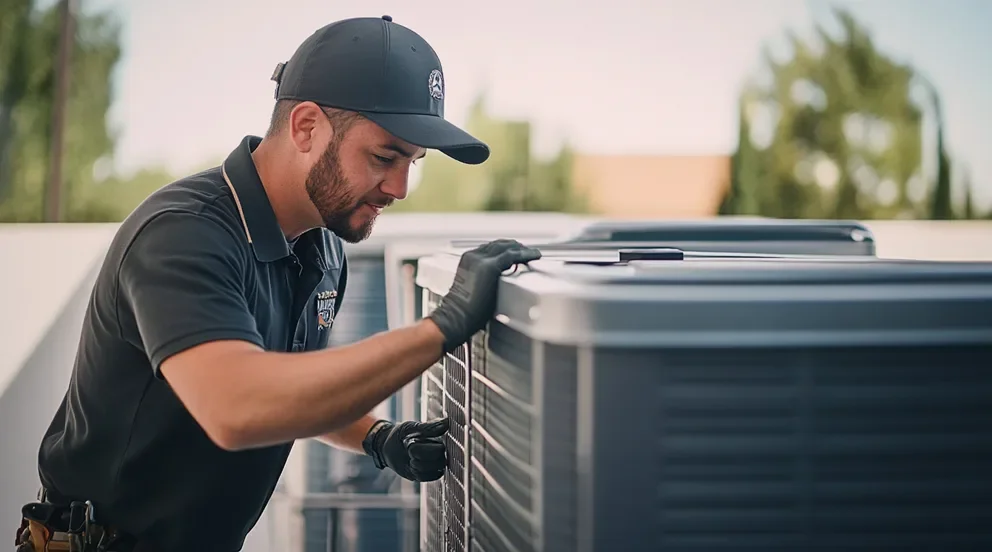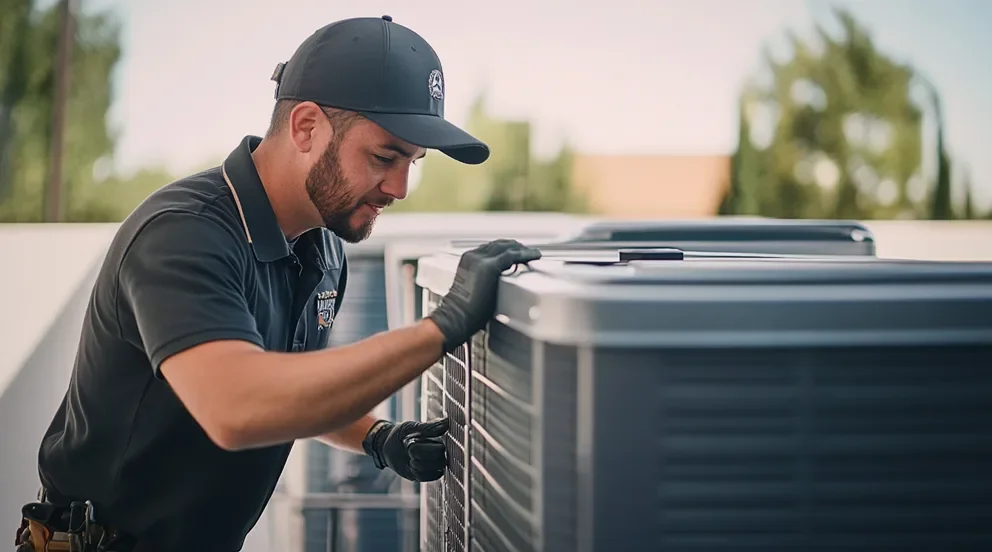An HVAC Contractor License is a certification that allows an individual or company to legally perform heating, ventilation, and air conditioning (HVAC) services in a specific state or jurisdiction. It is required by law for all HVAC contractors to have this license in order to operate their business and provide services to customers.
To obtain an HVAC Contractor License, one must meet specific requirements set by the state or jurisdiction in which they intend to work. These requirements may include having a certain level of education, completing a specific number of on-the-job training hours, and passing a written exam to demonstrate knowledge and competency in the HVAC field.
Having an HVAC Contractor License not only ensures that contractors are qualified to perform their work, but it also protects consumers from potential scams or subpar work. It holds contractors accountable for adhering to industry standards and regulations, and provides a means for customers to seek recourse if any issues arise.
In addition to obtaining a license, HVAC contractors must also renew their license periodically to maintain their qualification and stay up-to-date with any changes or advancements in the industry. This helps to ensure that contractors are continuously learning and improving their skills to provide the best services possible.
Not only does an HVAC Contractor License benefit customers and the industry, it also provides legitimacy and credibility to the contractor. It shows that they are serious about their profession and committed to meeting the standards set by their state or jurisdiction.
In conclusion, an HVAC Contractor License is a necessary and important requirement for anyone looking to operate an HVAC business and provide services to customers. It not only ensures the quality of work being performed, but also promotes safety, professionalism, and credibility in the HVAC industry.
Importance of Obtaining an HVAC Contractor License
Obtaining an HVAC Contractor License is crucial for anyone looking to work in the heating, ventilation, and air conditioning (HVAC) industry. This license serves as a validation of an individual or company’s skills and knowledge in the field, and is required by law in most states or jurisdictions to perform HVAC services.
One of the most important reasons for obtaining an HVAC Contractor License is to ensure the safety of both the contractor and their customers. HVAC systems can be complex and potentially dangerous if not installed or maintained properly. By requiring a license, states and jurisdictions are able to set standards and regulations for contractors to follow, reducing the risk of accidents or hazardous situations.
Having a license also demonstrates credibility and professionalism in the HVAC industry. It shows that the contractor has met specific requirements and has the necessary qualifications to perform their work. This not only instills confidence in potential customers, but also sets the contractor apart from unlicensed or inexperienced competitors.
Obtaining an HVAC Contractor License also protects consumers from potential scams or subpar work. With a license, contractors are held accountable for their actions and are subject to consequences if they fail to meet industry standards. This provides recourse for customers if they encounter any issues with the services provided.
In addition, having a license can also open up more opportunities for HVAC contractors. Many states or jurisdictions require a license to bid on government projects or work for larger construction companies. By obtaining a license, contractors are able to expand their client base and potentially increase their earnings.
Requirements for Obtaining an HVAC Contractor License
The requirements for obtaining an HVAC Contractor License vary by state or jurisdiction, but generally include a combination of education, on-the-job training, and passing a written exam.
Typically, individuals interested in obtaining an HVAC Contractor License must have a high school diploma or equivalent and may need to complete a specific number of post-secondary education courses in HVAC technology or related fields. They may also need to complete a certain number of on-the-job training hours under the supervision of a licensed contractor.
Once these requirements are met, individuals must then pass a written exam to demonstrate their knowledge and competency in the HVAC field. The exam may cover topics such as electrical components, system design, installation techniques, and safety regulations.
In some cases, additional requirements may need to be met before a license can be obtained. This may include obtaining liability insurance, registering with the state or jurisdiction, and paying applicable fees.
It is important for individuals to research the specific requirements for obtaining an HVAC Contractor License in the state or jurisdiction they plan to work in. Some states have reciprocity agreements, allowing licensed contractors from one state to work in another without having to obtain a separate license. Others may have different levels of licenses, such as a journeyman or master license, with varying requirements.
Benefits of Having an HVAC Contractor License
Having an HVAC Contractor License provides numerous benefits for both contractors and customers. Firstly, it ensures the quality and safety of work being performed, as licensed contractors are required to follow industry standards and regulations. This provides peace of mind for customers and reduces the risk of accidents or faulty installations.
Having a license also demonstrates professionalism and credibility in the HVAC industry. It shows that the contractor has met specific requirements and has the necessary skills and knowledge to perform their work. This can help attract potential customers and set the contractor apart from unlicensed or inexperienced competition.
By obtaining an HVAC Contractor License, contractors are also able to expand their client base and potentially earn more income. Many states or jurisdictions require a license to bid on government projects or work for larger construction companies. This opens up opportunities for licensed contractors to take on bigger and more lucrative projects.
Having a license also provides protection for both contractors and customers. This provides recourse for customers if they encounter any issues with the services provided, ensuring they receive quality and reliable work.
Additionally, obtaining an HVAC Contractor License can lead to career growth and advancement. Many states or jurisdictions have different levels of licenses, such as a journeyman or master license, which require further education and experience. By obtaining higher level licenses, contractors can increase their earning potential and take on more complex and challenging projects.
Renewing Your HVAC Contractor License
Renewing your HVAC Contractor License is a necessary and important process for maintaining your qualification and credibility as an HVAC contractor. Most states or jurisdictions require license renewal every few years in order to stay current with changes and advancements in the industry.
The specific renewal process and requirements may vary by state or jurisdiction, but generally involve completing continuing education courses, updating any necessary documents or insurance, and paying applicable fees. These courses may cover topics such as safety regulations, new technology, or changes in construction codes.
In addition to completing continuing education, contractors may also need to update their insurance. As well as provide proof of current coverage when renewing their license.
Paying applicable fees is also necessary for renewing an HVAC Contractor License. The amount and frequency of these fees may vary by state or jurisdiction. So it is important for contractors to research and budget accordingly.
It is important for contractors to plan ahead and submit their renewal application before their license expires. This helps to avoid any lapses in licensure and allows for time to complete any necessary requirements. It ensures that contractors are continuously learning and providing the best services possible to their customers.
HVAC Contractor License: Protecting Customers and the Industry
An HVAC Contractor License is an important requirement for anyone looking to work in the HVAC industry. It protects customers from potential scams or subpar work and promotes safety and professionalism. It nsures that contractors are qualified to perform their work.
Customers can have confidence that the contractor they are hiring has met specific requirements. As well as, ensure that they have the necessary skills and knowledge to perform HVAC services. This reduces the risk of accidents or hazardous situations. It provides a means for customers to seek recourse if any issues arise.
In addition, the license promotes safety and professionalism within the HVAC industry. It holds contractors accountable for adhering to industry standards and regulations. Also, it provides a means for consumers to report any concerns. This helps to maintain a high standard of work and protects both customers and the reputation of the industry.
Having an HVAC Contractor License also benefits the contractor by providing legitimacy and credibility. It demonstrates to customers that the contractor is serious and committed to their profession. It sets them apart from unlicensed or inexperienced competitors. This can help attract potential customers and open up more opportunities for growth and advancement in the industry.
Furthermore, the license ensures that contractors are continuously learning and improving their skills. This helps to maintain high-quality services and keep the industry competitive.
Key Takeaways
– An HVAC Contractor License is a certification required by law. It is for anyone looking to operate an HVAC business and provide services to customers.
– Obtaining an HVAC Contractor License ensures safety, credibility, and protection for customers and the industry.
– Requirements for obtaining an HVAC Contractor License include education, on-the-job training, and passing a written exam.
– Having a license can open up more opportunities for contractors to expand their client base and increase their income.
– Renewing an HVAC Contractor License is necessary to maintain qualification and stay current with industry standards.
– The license promotes safety, professionalism, and continuous learning within the HVAC industry.







